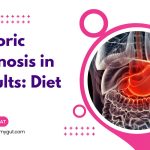Stabbing Chest Pain When Swallowing: 5 Causes, Gastroenterologist explains.
Our content is not intended nor recommended as a substitute for medical advice by your doctor. Use for informational purposes only.
Stabbing pain in the chest while swallowing is a sign of esophageal inflammation or ulcer. The most common cause is medication-induced esophagitis, esophageal infections, and GERD.
Less common causes include esophageal ulcers, esophageal cancer, esophageal hypersensitivity, radiation, and others.
1. Medication-induced esophagitis.
Cause:
Swallowing a pill that is irritant for the esophagus. It is common when you:
- swallow a pill without water.
- Swallow a pill at bedtime.
- Are older than 50 years old.
- Having an existing esophageal disease.
The pill gets stuck in the esophagus. It will cause esophageal inflammation if the drug is irritant. Consequently, the stuck pill will cause stabbing pain in the chest when you swallow.
Common medications include (reference):
- Pain-relieving medications (aspirin, ibuprofen, naproxen, diclofenac, and other non-steroidal anti-inflammatory drugs).
- Some antibiotics such as tetracycline and doxycycline.
- Potassium chloride (for potassium deficiency).
- Others such as Bisphoshphnates (for osteoporosis), quinidine (for heart diseases).
How common:
Drug-induced esophagitis is a common and overlooked condition. It is a more frequent cause of painful swallowing than famous diseases as GERD (reference).
Symptoms (how to suspect Pill esophagitis):
- History of swallowing an irritant pill without water (or without enough amount of water.
- Swallowing a pill at bedtime before the onset of the painful swelling in the chest.
- The symptoms usually start suddenly. Often few hours after the pill intake.
- Retrosternal stabbing chest pain.
- The pain is maximum during swallowing (odynophagia).
- Difficulty swallowing (dysphagia).
- Symptoms are often intermittent and self-limiting within a few days.
- Nausea or vomiting.
- Rarely, it may lead to complications such as ulcer, bleeding from the esophagus, or esophageal perforation.
Consult your doctor if you have extreme pain, bloody vomit, blackish stool, or persistent vomiting that is not going away.
2. Infections of the esophagus.
The esophagus can be infected, especially in patients with low immunity. Infections induce symptoms similar to pill esophagitis with a severe stabbing pain in the chest. But the symptoms are often more prolonged. It also can be associated with fever.
Causes of infectious esophagitis:
- Candidal esophagitis (fungal infection): the most common cause (reference).
- Herpes simplex virus esophagitis.
- Cytomegalovirus (CMV).
- Epstein-Barr virus (EBV).
- Varicella-zoster virus (VZV).
- Bacteria infections (the least common).
Esophagal infection often affects people with:
- Debilitating diseases
- Poor oral intake
- Low immunity (as HIV-infected patients).
Symptoms:
- Painful swallowing.
- Stabbing chest pain (greatest when swallowing).
- Dysphagia (difficulty swallowing).
- Presence of risk factors such as debilitating disease, decreased oral intake, HIV infection).
- Systemic symptoms such as fever and muscle aches.
- Nausea or vomiting.
3. GERD (Gastroesophageal reflux disease).
GERD is a widespread disease. It occurs due to the reflux of gastric acid into the esophagus.
When the reflux is significant, it causes inflammation of the esophagus. The condition is called Reflux esophagitis (reference).
Symptoms:
- Heartburn.
- Chest pain (stabbing during swallowing, vague in-between).
- Dysphagia (difficulty swallowing).
- Regurgitation of an acidic material into the esophagus and/or throat.
- Globus sensation.
- Water brush (increased salivation).
- Less common: chronic cough, asthma, hoarseness of voice, sore throat.
Severe GERD can lead to a condition called barret’s esophagus. The mucosa of the esophagus becomes lined with atypical cells.
Barret’s esophagus is a complication of reflux esophagitis. It may also manifest with stabbing pain in the chest when swallowing.
MORE: Causes of Heartburn That is Not Going Away.
MORE: How Long Does GERD Take to Heal.
4. Esophageal ulcers.
Esophageal ulcers are a breakdown in the lining of the mucosa. It usually presents with severe pain in the chest during swallowing.
We consider esophageal ulcers a complication of different diseases rather than a separate condition.
Common causes of esophageal ulcers:
- GERD (reflux esophagitis): The most common cause of esophageal ulcers (reference).
- Repeated induced vomiting (as with bulimia nervosa).
- Pill-induced esophagitis.
- Esophageal infections
- Esophageal cancers.
- Acid-rich foods, alcoholo, and caffeinated drinks.
5. Esophageal cancer.
Esophageal cancer is the 8th-most common cancer and the 6th-most common cause of death worldwide.
Painful swallowing or stabbing chest pain can be a sign of esophageal cancer.
Who is at higher risk of esophageal cancer? (reference).
- Being older in age (more than 85% of cases are above the age of 55).
- Family history of esophageal cancer.
- Alcoholo, smoking.
- Infection with Human Papillomavirus.
- Barret’s esophagus (a complication of GERD).
- Obesity.
- Others, Learn More.
Symptoms of esophageal cancer:
- Difficulty swallowing (dysphagia)
- Weight loss without trying.
- Stabbing pain in the chest while swallowing (odynophagia)
- constant feeling of pressure or burning.
- Worsening indigestion or heartburn
- Coughing or hoarseness
6. Other (rare causes).
- Eosinophilic esophagitis: chronic, immune-mediated inflammation of the esophagus. It is characterized by infiltration of the esophageal mucosa with eosinophils. Learn More.
- Esophageal motility disorders: Corkscrew esophagus, achalasia, diffuse esophageal spasm. Learn More.
- Radiation-induced esophagitis.
- Psychological disturbances. Learn More.
- Esophageal Perforation.
- Ingestion of corrosive substances.
- Evidence-based
- Written by a doctor.

Related Posts:
- 4 Main Causes of Chest Pain After Eating Chocolate…
- Can Gallbladder Pain Affect your Back Only?…
- Celiac Disease Stomach Pain: Incidence, Location, &…
- Fatty Liver Pain: Causes, Mimics, and Treatment;…
- Stomach Pain at Night and Early Morning: 6 Causes,…
- Can Stress Cause Appendicitis? Gastroenterologist Explains.





